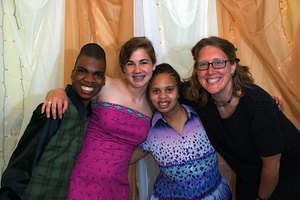I should start by explaining that our family lives in a dorm
with thirty high school boys. On Friday night, I came home to find my husband
in the playroom on the couch talking to two of those boys sitting on the floor.
They were asking questions about God–everything from “How do you explain
suffering?” to “Do you think I’m going to hell since I don’t believe in God?”
to “What’s the deal with no sex before marriage?” to “Are Catholics
Christians?” to “When God talks to you, do you literally hear a voice?”
I soon joined in. And although I had heard many of these
questions before, and although I offered some of my “standard” answers, I was
struck by how difficult it is to explain what I believe and why that might
matter to a sixteen-year old boy.
Essentially what I wanted to communicate is that there is a
spiritual reality all around us all the time, but it is only through faith that
we have eyes to see it and the ability to actively participate in it. This spiritual
reality makes life more difficult. It involves seeing a reality about myself,
that I am not God, and it involves seeing a reality about the world, that it is
really messed up and broken. But it also makes life better. It involves
trusting that the one who created all things cares about the intimate details
of my little life. It involves trusting that there is purpose in my life. It
involves seeing the image of God in human beings, seeing the inherent value and
beauty and joy and goodness in every person I encounter. Participating in God’s
spiritual reality breaks me, and it blesses me.
But what I also wanted to communicate is that I wasn’t talking about some vague idea of God or spirituality. Instead, that I believe the fullness of spiritual reality is embodied in the person of Jesus. Paul writes, in Colossians, “[Jesus] is the image of the invisible God.” Through Jesus, we know what God looks like–what God loves and hates, that God acts with compassion, that God is humble, decisive, and, at times, funny. Through Jesus, we know that God takes our self-centeredness (and our opposition to God-centeredness) so seriously that he died to save us from it. Through Jesus, we know that God lives, that love conquers, that eternal life in the presence of God is possible, starting now.
One of the boys said, “Mrs. Becker, I grew up Catholic, but I stopped believing when I got to high school. And I don’t feel God’s absence. I don’t really notice a difference.”
It makes some sense–he’s a popular kid who plays Varsity sports and does fine in school. What difference would God make in an already satisfying life? I didn’t try to argue with him, although I suspect a time will come, whether in the death of a loved one or the loss of a dream or any number of the disappointments that come with age, when that absence becomes more tangible. Instead I said, “I wonder whether you might someday long for God’s presence. I think of someone who is happily single, with everyone around him getting married. Perhaps the day comes when he doesn’t feel the absence of a spouse but instead longs for the presence. If there is a God who actually cares about you, it seems worth finding out, whether or not you feel the absence.”
I believe that life with God is possible for every human being, and that life with God is how life was meant to be lived. And I believe that life in the presence of God is worth pursuing, even if we don’t recognize his absence. And I believe that finding words to convey this truth is increasingly difficult. Which means that, in addition to my words, I need to live my own life in this spiritual reality, in all its brokenness and all its beauty.

